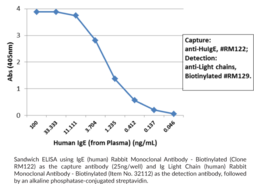Territorial Availability: Available through Bertin Technologies only in France
- Product Overview:
Immunoglobulin E (IgE) is a member of the immunoglobulin superfamily of glycoproteins that plays a central role in type I hypersensitivity reactions and the immune response to parasites.{28520,54323,54324} It is synthesized by B cells and later secreted by plasma cells and is the least abundant circulating antibody in human serum.{28520,54323} IgE consists of two light chains and two heavy chains, or ? chains, that contain one variable region and four Ig-like constant domains C?1-C?4, but lacks the flexible hinge region seen in IgD, IgG, and IgA.{54324,54325} The heavy chains are linked together by disulfide bonds to form an Fc region and also combine with the light chains to form the Fab region, which mediate receptor and antigen binding, respectively.{55171} IgE binds to type I Fc? receptors (Fc?RIs) on the surface of mast cells, basophils, and antigen-presenting dendritic cells.{54323} Multivalent antigen binding to IgE on the surface of mast cells induces IgE crosslinking and mast cell degranulation to initiate type I hypersensitivity reactions, including, but not limited to, systemic anaphylaxis, wheal and flare responses, allergic rhinitis, bronchial asthma, and food allergies. Serum levels of IgE are elevated in response to parasitic infection and IgE directly binds parasites to target the parasite for eosinophil degranulation-induced destruction. Cayman’s IgE (human) Rabbit Monoclonal Antibody – Biotinylated can be used for ELISA.
Cayman Chemical’s mission is to help make research possible by supplying scientists worldwide with the basic research tools necessary for advancing human and animal health. Our utmost commitment to healthcare researchers is to offer the highest quality products with an affordable pricing policy.
Our scientists are experts in the synthesis, purification, and characterization of biochemicals ranging from small drug-like heterocycles to complex biolipids, fatty acids, and many others. We are also highly skilled in all aspects of assay and antibody development, protein expression, crystallization, and structure determination.
Over the past thirty years, Cayman developed a deep knowledge base in lipid biochemistry, including research involving the arachidonic acid cascade, inositol phosphates, and cannabinoids. This knowledge enabled the production of reagents of exceptional quality for cancer, oxidative injury, epigenetics, neuroscience, inflammation, metabolism, and many additional lines of research.
Our organic and analytical chemists specialize in the rapid development of manufacturing processes and analytical methods to carry out clinical and commercial GMP-API production. Pre-clinical drug discovery efforts are currently underway in the areas of bone restoration and repair, muscular dystrophy, oncology, and inflammation. A separate group of Ph.D.-level scientists are dedicated to offering Hit-to-Lead Discovery and Profiling Services for epigenetic targets. Our knowledgeable chemists can be contracted to perform complete sample analysis for analytes measured by the majority of our assays. We also offer a wide range of analytical services using LC-MS/MS, HPLC, GC, and many other techniques.
Accreditations
ISO/IEC 17025:2005
ISO Guide 34:2009
Cayman is a leader in the field of emerging drugs of abuse, providing high-purity Schedule I-V Controlled Substances to federally-licensed laboratories and qualified academic research institutions for forensic analyses. We are certified by ACLASS Accreditation Services with dual accreditation to ISO/IEC 17025:2005 and ISO Guide 34:2009.





